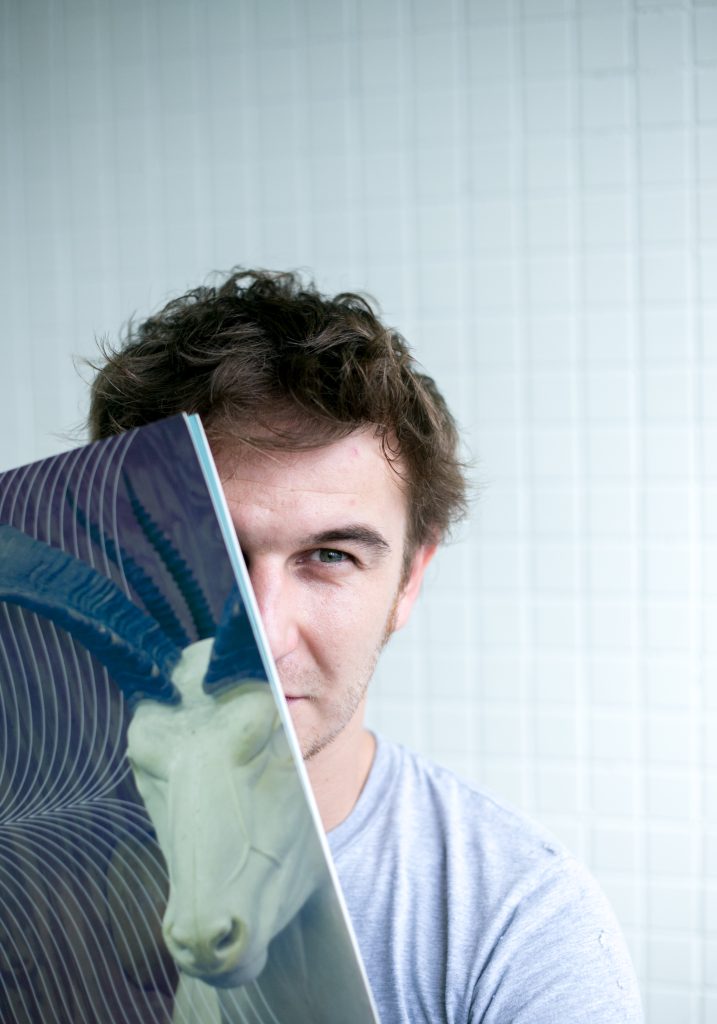
采访时间:2016年8月4日 Interview Date: August 4, 2016
Jef Vreys:比利时人,毕业于中国历史专业,曾在四川大学进修中文,2007年起开始居蓉生活。2009年,创办独立音乐厂牌NewNoise,为小而特别的中外乐队搭建海外演出平台,将诸多国外大牌乐队带来中国演出,尤其是成都。
Jef Vreys: Belgian, a Chinese history major graduate. He once studied Chinese in Sichuan University and has been living in Chengdu since 2007. In 2009 He founded his indie music brand NewNoise, which offered overseas performance platforms for small yet distinctive bands that are either from China or from other countries. He has brought many big foreign bands to China to perform, especially to Chengdu.
http://newnoise.cn/
※
如果说“地下音乐”,大众难免会有先入为主的误解——黑暗、非主流、反动等等,然而,地下音乐的特性更准确的近乎是:独立小众传播、与商业音乐对抗、具有先锋意味。
Underground music may strike one as being dark, non-mainstream and rebellion. However, a more precise definition would be the music that circulates in small groups, rebels against commercial music and acts as a pioneer.
独立音乐,灵魂在相互寻找
Independent Music Searches for its Soulmate
2007年,比利时小伙Jef来华留学,在北京大学、清华大学和四川大学之间选择了有着许多旅游景点的后者,也因为他想避开2008年北京奥运会涌动的外籍大潮,感受新旧交融的中国人文。学习期间,Jef就喜欢去小酒馆看演出,他回忆道:“那时候最火的也就属小酒馆了。”
In 2007, a Belgian guy Jef came to study in China. He chose Sichuan University situated in Sichuan, which is home to many tourist attractions over Peking University and Tsinghua University – on one hand, he wanted to avoid the foreign visitors that flooded into Beijing for the Olympic Games in 2008 and on the other hand, he thought that he could experience Chinese culture featuring the blend of the old and the new. During the study, Jef used to watch performance in small taverns. “Small taverns were the people’s favorite,” recalled Jef.
8岁那年,Jef随父亲看了第一场地下音乐演出,开启了对音乐不一样的偏好和感知。15岁时他在乐队The Maple Room担任贝斯手,并策划了人生第一场演出。Jef的音乐志趣与中国市场的发展潜力促使他成立了自己的独立音乐厂牌NewNosie,其名出自Refused乐队的一曲歌名,代表着一种鲜明的音乐态度——主流的电视广播和商业化使音乐趋同,我们应该创造不一样的音乐,新的声音。
At the age of eight, Jef’s father took him to see an underground music performance, which was the first time he had ever seen anything like this. Ever since then, he began to develop his unique preference and perception of music. At the age of fifteen, he was the bass player in a band called The Maple Room and planned his very first concert. Jef’s music interest and the development potential in the Chinese market urged him to found his indie music brand NewNoise, which got its name from the song of a band called Refused. It represents a distinct music attitude: instead of being assimilated by mainstream TV broadcast and commercial music, we need to create different music and new voices.
Jef成为游走中外地下音乐界的乐队经纪人,将国外乐队带来中国,比如MONO、冰岛的Múm乐队;将成都乐队带去欧洲,比如惘闻。相似的灵魂总是在寻找着相遇的契机,多元的音乐吸引着彼此的交流和碰撞。Jef说:“地下音乐更像是一种运动,它更加独立小众,正在被越来越多的人理解和接受,它依旧有别于普罗大众喜欢的主流音乐。”
Jef became a band agent who shuttled through Chinese and foreign underground music circles and brought foreign bands to China, such as MONO and Iceland-based band Múm. He also brought Chengdu bands to Europe, such as Wang Wen. Similar souls are always looking for opportunities to collide and diversified music trigger mutual communication and exchanges. “Underground music is more of a movement. As much as it reaches only a small crowd, it is now being accepted and understood by more people. Yet it still distinguishes itself from more popular mainstream music,” said Jef.
如期所料,这确实并非易事,第一次带比利时的一支乐队来中国演出,Jef花了半年的时间进行前期联络。即使发展至今,业界小有名气的Jef在给乐队发出第一封联络邮件时,除了介绍自己、公司、合作过的乐队,更多的内容是关于中国和成都。毕竟,中国,尤其是西南城市成都,对于很多国外乐队而言,依旧是一个遥远、陌生的神秘名字。
As it turns out, it is not a piece of cake. The first time Jef brought a Belgian band to China for performance, it took him half a year to make it happen. Even now, Jef, a minor celebrity in the industry, introduced more about China and Chengdu other than himself, his company or partner bands in the first mail he sent to the bands. After all, China, especially Chengdu, a city located in Southwest China, is still a mystery in the eyes of many foreign bands.
成都制造,暗涌的音乐热潮
Made in Chengdu – The Music Trend on the Rise
2009年居成都至今,Jef全触角体会到了成都地下音乐市场的变化。“成都的音乐氛围很好,乐队之间互相捧场帮忙,是个有爱的大家庭。这些年来,阿修罗、声音玩具等老乐队还依旧在演出,秘密行动、荷尔蒙小姐这样的新一代音乐力量也在蓬勃生长。新乐队大多有专业的音乐学习背景,他们的出现让老乐队更加努力,竞争氛围也很好。”如今,成都地下音乐的风格从新金属到电音、Indie等更加多元,演出场所也不再局限于酒吧,城市里有了更多的新空间。2007年之后成都有了音乐节,热波、大爱、草莓……听众对“地下”的认知在更新,越来越多的人喜欢上这种“小众”。
Since he settled in Chengdu in 2009, Jef has completely experienced the changes in Chengdu’s underground music market. “Chengdu has a good music vibe; bands show up and root for each other, which together make a harmonious family. In the past few years, old bands, such as Asura and Sound Toy still did gigs while new generation bands like Stolen and The Hormones were booming. Most of the new bands have professional music background, whose development drives old bands to work harder,” said Jef. Now, Chengdu’s underground music diversified – from new metal to electronics, Indie and many other genres. Performance venues are no longer confined to pubs; the artists begin to perform in various urban places. In 2007, Zebra, Big Love and Strawberry and many other music festivals came to Chengdu. The public got to learn more about “underground music” and grew to love this type of “minority” music.
三年前(2013年),Jef和搭档策划了“成都制造”室内音乐节,集合了成都大小名气的各种本土乐队。两年间,每场音乐节参与观众超过两千人。
Three years ago (year of 2013), Jef and his partners planned an indoor music festival called “Made in Chengdu”. It gathers Chengdu’s local bands, whether their fame is big or small. In the past two years, each music festival attracted more than 2,000 audiences.
在成都做外国乐队演出之难,既是地理问题,也是钱的问题。Jef说:“外籍乐队来中国内地的机票比到香港贵很多,但票价会比香港便宜很多,知名乐队想要做大型演出,对设备和空间的要求就高,成都目前还不够成熟……”
It is difficult to get foreign bands to perform in Chengdu not only because of geological problem, but also due to the matter of money. “Foreign bands have to pay more expensive air tickets to come to mainland China, compared with Hong Kong. However, they earn less from ticket income. In addition, in terms of large-scale performance, renowned bands often raise higher demands for equipment and space, but Chengdu is not yet mature enough to meet such demands,” said Jef.
那么,如何吸引外国乐队?Jef 说:“我会告诉他们这将是一次全新的体验!”无论是演出本身、市场前景,或者是川菜入嘴那一口的辣,对外籍乐手都是与截然不同的经历。而且喜欢研究中国历史的Jef,还时常扮演导游的角色,给乐队介绍北京的紫禁城、成都武侯祠的三国文化等,也让乐队对中国的理解稍微深一点儿。
Then, how did he attract foreign bands to come? “I would tell them that it would be a brand new experience!” said Jef. Indeed, the performance, the market prospect and the spicy Sichuan food are unprecedented in their previous experiences. Moreover, Jef, who likes to study Chinese history, often acts as a guide to introduce Beijing’s Forbidden City and Three-Kingdom culture of Chengdu’s Wuhou Temple to these bands, who thus get to know more about China.
Jef对比了一个有趣的现象:“比利时的乐队如果在国内出名了,他们会尝试走出国门。但是中国多的大多数乐队没有这个意识,觉得‘没人知道我们,所以我们不去’,其实思维应该恰好相反——不知道,所以要去。”Jef也很清醒地知道,这背后有截然不同的生活习惯和文化差异。社会在发展,会有越来越多的人关注生活品质、文化历史,而包容的成都每天都变幻出崭新的面孔。
Jef also talked about an interesting phenomenon. “If a Belgian band becomes famous in their own country, they will seek to expand foreign markets. Their Chinese counterparts, however, don’t see things this way. They believe that they couldn’t go there since no one knows them yet. In fact, it should be the other way around.” Jef also knows clearly that strikingly different life habits and culture underlie this phenomenon. As the society keeps developing, people will focus more on life quality, culture and history. Chengdu, this inclusive city, keeps unveiling its many new faces on a daily basis.
※
All rights reserved, contact Lenore to know more.
